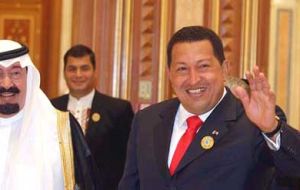MercoPress. South Atlantic News Agency
Chavez warns US at Opec summit but is rebuked by Saudis
 King Abdalá bin Abdelaziz with Pte. Chavez , behind (left) Ecuador Pte. Correa and Iran Pte. Ahmadinejad
King Abdalá bin Abdelaziz with Pte. Chavez , behind (left) Ecuador Pte. Correa and Iran Pte. Ahmadinejad In his opening address at a rare Organisation of Petroleum Exporting Countries (Opec) summit in the Saudi capital, Hugo Chavez, the Venezuelan president, has warned the US over rising oil prices.
Speaking in Riyadh, Chavez said that oil prices would further surge from $100 to $200 if America contemplates an attack against his country or Iran. The president declared that Opec should "assert itself as an active political agent" but appeared to be rebuked by Saudi King Abdullah. Minutes after Chavez's speech on Saturday the king said: "Oil is an energy for development, it should not become a tool for conflict and emotions." Oil, finance and foreign ministers of Opec are meeting against the backdrop of a depreciating dollar and tension in world oil markets. Chavez said: "I think Opec should strengthen itself in this capacity and demand respect for the sovereignty of our nations, if the developed world wants a guaranteed supply of oil. We are witnessing constant threats against Iran." In his speech, King Abdullah said: "Those who say that Opec should be a manipulative monopoly are ignoring the fact that Opec had always behaved moderately and wisely." The Saudi king also tried to redirect the Opec opening session to the summit's agenda, announcing a move to support environmental efforts. He said: "I wish to announce that the Saudi government has put US$300m in a program to finance scientific research in the fields of energy, environment and climate." The two-day summit is only the third in Opec's 47-year history. Earlier this week, Samuel Bodman, the US energy secretary called on Opec to increase production in order to halt oil price rises. But Opec officials said they will not discuss whether or not to increase oil supplies until the group meets next month in the United Arab Emirates. They also cast doubt on the effect any output hike would have on oil prices, saying the recent rise has been driven by the falling US dollar and financial speculation by investment funds, rather than any supply shortage. In a closed session of foreign and finance ministers, Saudi Arabia, a close US ally, objected to a bid by Iran and Venezuela to highlight concern over the weakness of the US dollar. The group voted the proposal out. Abdalla Salem el-Badri, the Opec secretary-general, said the group had decided not to mention concern over dollar depreciation in the declaration. Saud al-Faisal, the Saudi foreign minister, told the session: "My fear is that any mention that Opec makes of studying the issue of the dollar will in itself have an impact." A microphone mistakenly left on meant that the comments of al-Faisal were accidentally broadcast to journalists on Saturday. He rejected the proposal by Iran and Venezuela who wanted the meeting to discuss the weak dollar, saying: "There are media people outside waiting to catch this point and they will add to it [exaggerate] and we may find that the dollar collapses." Embarrassed organisers switched off the microphones when they discovered their blunder. Opec is under pressure to increase its output to help calm record crude prices that reached almost $100 a barrel for the first time last week. Some Opec members want to increasingly sell their oil in euros and not dollars. The Gulf Arab states and Saudi Arabia earn more than a billion dollars a day from oil sales. Mamdouh Salameh, an international oil expert, told Al Jazeera: "Saudi Arabia and Kuwait are under the US military umbrella. Consequently, it will be anti-American decision if they shift to another currency other than the dollar." Concern is growing, however, that the dollar's weakness signals the end of its reign as the world's main international currency. And the greenback would be further damaged if Opec started selling its oil in euros or created a basket of currencies as some producers now want. Saudi Arabia's investments in the US - and many other countries - are also threatened by a weaker dollar. The dollar has fallen 10 per cent against the euro this year. This has hit oil producers and slashed income. The falling dollar has also made imports - which countries especially in the Gulf rely on - much more expensive. Inflation has rocketed, hitting the huge numbers of low paid foreign workers especially hard. Now Gulf currencies, such as the UAE dirham which has been pegged to the dollar for the past 30 years, could be unpegged because of growing pressure. MP/Agencies




Top Comments
Disclaimer & comment rulesCommenting for this story is now closed.
If you have a Facebook account, become a fan and comment on our Facebook Page!